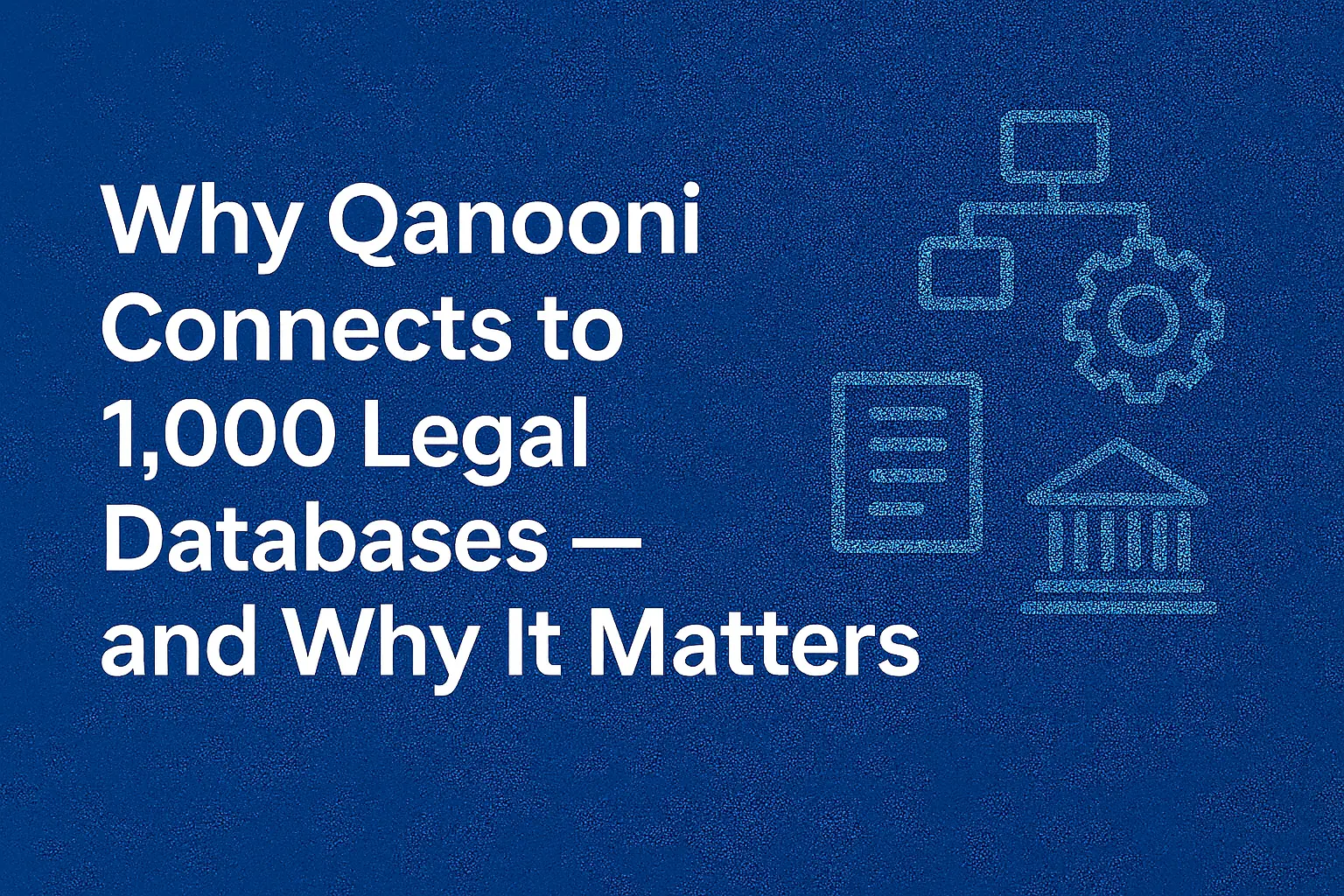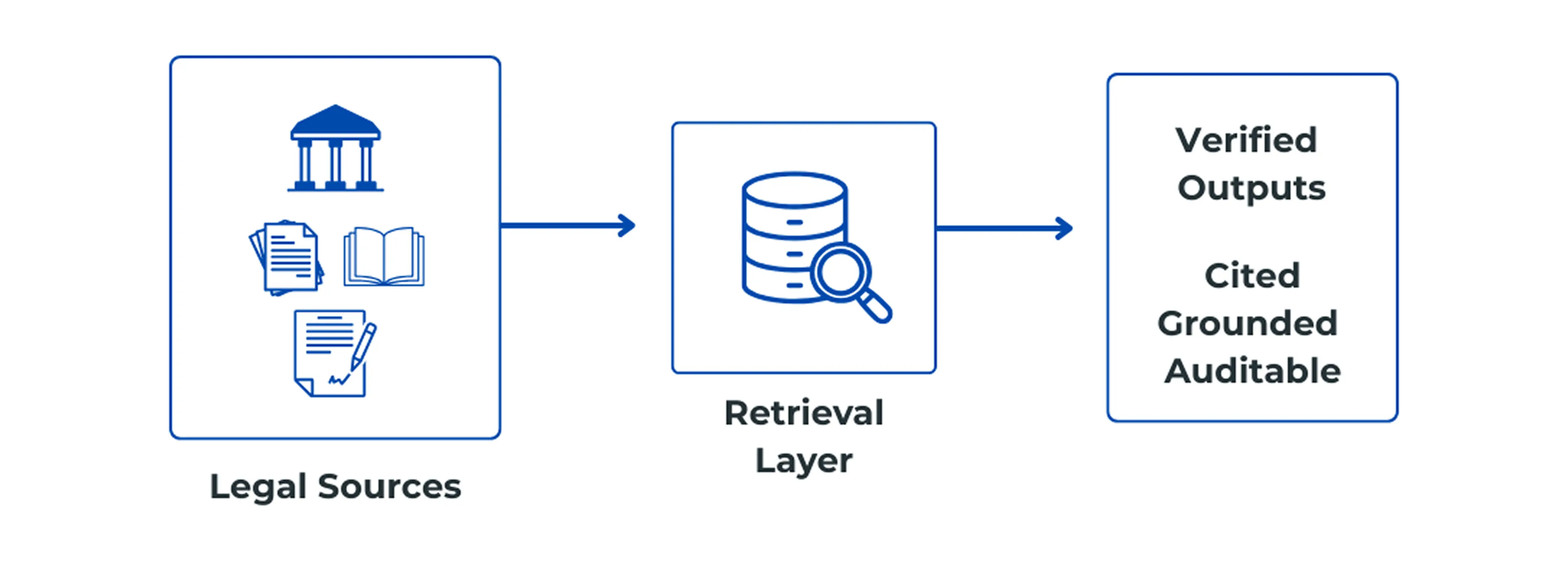
Why Qanooni Connects to 1,000 Legal Databases and Why It Matters
Every lawyer asks the same question when they first try AI: "But can I trust what it tells me?"
The honest answer is: only if it knows where to look.
Qanooni connects to over 1,000 verified legal databases covering the UAE, GCC, UK, and EU so every answer, clause, or citation is grounded in law, not guesswork. This isn't about scale for the sake of it. It's about building an AI infrastructure that lawyers can trust; accurate, explainable, and auditable.
The problem with most AI: hallucinations and opacity
Generic AI models are extraordinary at generating text but notoriously bad at verifying facts. They predict words, not truth. When asked legal questions, they often hallucinate; inventing cases, statutes, or principles that don't exist.
Lawyers have already seen the consequences. In both the UK and US, courts sanctioned lawyers in 2023–24 for submitting filings based on non-existent AI-generated case law. The issue wasn't laziness; it was infrastructure. The tools they used didn't have access to real legal sources.
For legal professionals, that's unacceptable. You don't need creativity. You need citation-backed precision.
Qanooni's legal data infrastructure
Qanooni's infrastructure spans more than 1,000 legal databases, combining statutory laws, case law, regulatory frameworks, official gazettes, and firm-specific knowledge layers. Every connection is permissioned, timestamped, and continuously refreshed.
| Data Layer | Source Examples | Purpose |
|---|---|---|
| Statutory Laws | UAE Federal Laws, DIFC/ADGM Regulations, UK Acts, EU Directives | Statutory grounding for drafting and reviews |
| Case Law & Precedents | DIFC Courts, UK Supreme Court, ECHR, UAE Cassation Judgments | Supports legal reasoning and QCounsel analysis |
| Regulatory Frameworks | SRA, DFSA, FCA, GDPR, UAE Data Office | Keeps compliance outputs current |
| Official Gazettes | UAE, UK, EU Gazettes | Tracks legislative amendments and repeals |
| Firm Knowledge Layer | Internal playbooks, precedents, templates | Customises outputs to firm standards |
Each source is indexed by jurisdiction and version-controlled for traceability.
Top 3 benefits of Qanooni's data infrastructure
- Trust through verification: Every output is backed by citations from verified laws and rulings.
- Explainability at scale: Lawyers can trace each response to its legal origin in seconds.
- Compliance by design: All data connections comply with DIFC, ADGM, SRA, and GDPR standards.
How it eliminates hallucinations
Hallucinations thrive when AI models must "fill in the blanks." Qanooni removes the blanks. Its retrieval-augmented generation (RAG) engine searches real databases before generating an answer, returning citations and reasoning side by side.
Unlike generic AI, Qanooni's outputs are:
- Cited: linked to primary legal sources.
- Grounded: drawn from laws, not training noise.
- Auditable: every step logged for verification.
How Qanooni's Legal Data Infrastructure Works

Real-world example
A UAE firm reviewing cross-border contracts asked Qanooni about employee termination rights. The system retrieved and cited:
- DIFC Employment Law No. 2 of 2019 (Articles 60–63)
- Federal Labour Law No. 33 of 2021 (Article 44)
- UK Working Time Regulations 1998 for comparison
The partner's report included clickable citations and audit logs — impossible with generic AI tools.
How firms benefit
- Accuracy at scale : Lawyers don't waste hours re-checking sources.
- Consistency across offices : All teams work from the same verified legal backbone.
- Client assurance : Outputs can be shared with clients, complete with citations.
- Audit trails for regulators : Full traceability meets SRA and UAE compliance requirements.
Data sovereignty across regions
In the UAE and wider MENA, Qanooni's infrastructure aligns with the UAE National Data Strategy (2023–2026) and GCC data sovereignty frameworks. Data from local jurisdictions remains stored and processed within Microsoft's UAE data centres, ensuring compliance with DIFC and ADGM localisation requirements.
In the UK, Qanooni adheres to the SRA's confidentiality guidance and the UK GDPR, ensuring full alignment with the post-Brexit regulatory environment.
For reference, Gulf News recently noted the growing focus on sovereign data management in UAE AI systems, whilst the Law Society Gazette highlighted the UK's increasing emphasis on AI explainability for professional accountability.
Frequently Asked Questions
What does Qanooni connect to?
Over 1,000 statutory, case law, regulatory, and official gazette databases across UAE, GCC, UK, and EU jurisdictions.
Why is this different from other AI tools?
Generic AI guesses from training data. Qanooni retrieves and verifies from live legal databases before answering.
Does this mean Qanooni never hallucinates?
No. But hallucination risk is reduced to near-zero. Every citation is cross-referenced and verified before output.
Can firms add their own data?
Yes. Qanooni integrates internal playbooks, precedents, and clause libraries securely within each firm's tenant.
Is this compliant with UAE and UK regulations?
Yes. Qanooni complies with DIFC DP Law 2020, ADGM Data Regulations, and UK GDPR.
👉 Related reading: The Lawyer's Guide to AI-Native Compliance in EMEA and Case Study: AI-Native Risk Analysis in UAE Contracts.
Closing thought
Legal AI can only be as good as its data. Qanooni's 1,000-database infrastructure isn't about quantity — it's about integrity. Every citation, clause, and research answer is grounded in law, giving lawyers something AI has rarely offered before: trust you can verify.
👉 Want to see how Qanooni's infrastructure supports your firm's AI workflows? Book a demo today.